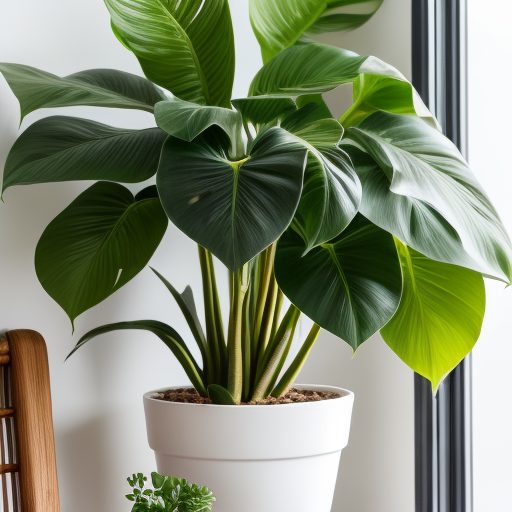HousePlantJoy is supported by our audience. When you purchase through one of our links, we may earn a small affiliate commission. As an Amazon Associate I earn from qualifying purchases. Your cost is not affected.
==================
Are you looking to add some greenery to your home but don’t have a lot of space? Indoor climbing plants are the perfect solution. Not only do they add a touch of nature to your indoor space, but they also offer numerous benefits. These include purifying the air and reducing stress levels. In this blog post, we will explore the world of climbing plants and introduce you to some of the best varieties for your indoor garden. We have got you covered from versatile vines like the Golden Pothos to colorful options like the Arrowhead Plant and String of Hearts. We will also provide tips on choosing the right climbing plant for your space and caring for them properly. So, let’s get started on creating a beautiful and healthy indoor oasis. Enjoy reading!
The Magic of Indoor Vine Plants
Indoor vine plants bring a touch of natural beauty to any space. This makes them a must-have for indoor gardens. These vining houseplants are not only stunning, but they are also easy to care for, making them perfect for beginners. One of the most common vining houseplants is the Philodendron Hederaceum, the pothos plant. These plants can be trained to climb with their long vines, creating beautiful indoor displays. Not only do indoor vine plants add aesthetic appeal, but they also help purify the air, improving indoor air quality. The Epipremnum Aureum, commonly known as the pothos plant, is an evergreen vine that thrives in indirect sunlight and is resistant to root rot. It’s no wonder why indoor vine plants are so popular. They create a sense of tranquility and beauty in any indoor space.
Benefits of Easy Indoor Climbing Houseplants
Vining houseplants offer numerous benefits, making them an ideal indoor garden choice. These plants are low-maintenance, making them perfect for busy individuals who don’t have much time for gardening. Even in low light conditions, vining houseplants can thrive and add greenery to small spaces like apartments. One of the most common vining houseplants is the pothos plant. It’s also known as Epipremnum Aureum. These plants beautify your indoor space and improve indoor air quality by reducing carbon dioxide levels. Another advantage of vining houseplants is that they can be grown in hanging baskets, saving valuable floor space. With so many benefits, there’s no doubt that vining houseplants are a great addition to any indoor garden.
We’d like to introduce you to some hanging planters that can be a great addition to your indoor climbing plants. Feel free to take a look! #recommendations #affiliatecommission
A Glimpse into the World of Indoor Climbing Flowers and Plants
Climbing plants are fascinating additions to indoor spaces, offering unique visual interest. With their growth habit, they have the ability to climb and cover surfaces, transforming any area into a lush and green paradise. Originating from regions like Southeast Asia and East Asia, these plants bring exotic beauty to your home. Some climbing plants, such as Devil’s Ivy, can even tolerate direct sunlight, making them versatile options for any location. Other popular indoor vine plants, like Monstera Adansonii, thrive in bright indirect light, adding a vibrant and dynamic element to your indoor garden.
Characteristics of Climbing Plants
Climbing plants possess unique characteristics that make them perfect for indoor gardens. With their aerial roots, these plants can attach themselves to surfaces. This provides them with the necessary support to grow and thrive. Many climbing plants, such as the Hedera Helix, are evergreen, ensuring year-round beauty in your indoor space. Some climbing plants, like the Swiss Cheese plant, boast large and unique leaves, adding a touch of visual interest to your garden. Other climbing plants, like the spider plant, produce trailing stems, making them ideal for hanging baskets. Additionally, most climbing plants, including the Heartleaf Philodendron, are low-maintenance and easy to care for.
Golden Pothos (Epipremnum Aureum): The Versatile Vine
Golden Pothos (Epipremnum Aureum) is a versatile vine that is a popular choice for indoor gardens. This indoor climbing plant is well-known for its heart-shaped leaves, adding a touch of elegance to any space. One of the great things about Golden Pothos is its adaptability to different lighting conditions. While it thrives in bright indirect light, it can also tolerate low-light environments, making it a perfect choice for those with less sunlight available.
With its trailing vines, Golden Pothos is ideal for hanging baskets and can be trained to climb walls, adding a vertical element to your indoor garden. Additionally, golden pothos is easy to propagate, making it a favorite for plant enthusiasts who want to expand their collection. Not only does golden pothos bring beauty to your indoor space, but it also helps purify the air by removing toxins, creating a healthier environment.
The Beauty of Grape Ivy (Cissus Rhombifolia)
Grape Ivy, also known as Oakleaf Ivy, showcases stunning textured leaves that add a touch of elegance to any indoor garden. This climbing plant thrives in bright, indirect sunlight. This makes it an excellent choice for areas with limited natural light. With its long vines, grape ivy creates a beautiful cascading effect, adding visual interest to your space. It can even produce small, fragrant flowers if provided with ideal conditions, further enhancing its charm. As a tropical plant, grape ivy brings a touch of exotic allure to indoor gardens. Explore the beauty of this unique vine and elevate your indoor greenery.
Creeping Fig (Ficus Pumila): A Green Curtain for Your Home
Creeping Fig (Ficus Pumila) is a versatile climbing plant that thrives indoors, even in low indirect sunlight. Its small leaves create a lush green curtain effect, adding beauty to any room. This vine plant can be trained to cover walls, bringing a unique design element to your home. With proper care, creeping fig develops aerial roots for better growth, and its dense foliage provides privacy and acts as a natural sound barrier. Creeping Fig (Ficus Pumila) is indeed a beautiful vine. It is ideal for creating a green oasis within the comfort of your own home.
Arrowhead Plant (Syngonium Podophyllum): A Splash of Color
Arrowhead plants, also known as Arrowhead Vine, bring a splash of color to indoor spaces with their various leaf colors. Thriving in indirect light, they are well-suited for indoor conditions. These climbing plants have stems that make them perfect for growing on moss poles. With their unique arrowhead-shaped leaves, they create a visually appealing display. Arrowhead plants can even tolerate low light conditions, brightening up the dim corners of a room. So, if you’re looking for a vibrant and visually striking addition to your indoor garden, the Arrowhead plant is a great choice.
String of Pearls (Senecio Rowleyanus): A Unique Decorative Element
String of Pearls (Senecio Rowleyanus) is a unique decorative element for your indoor garden. This trailing plant features small spherical leaves that resemble pearls, creating an elegant and charming display. It thrives in bright indirect light, making it ideal for hanging planters. With its low-maintenance nature, string of pearls requires minimal care and attention. It’s perfect for busy plant lovers. The long, trailing stems add a touch of beauty to any indoor space, making it a popular choice among plant lovers. You can incorporate this stunning vine plant into your home for a touch of greenery and sophistication.
Betel Leaf Plant (Piper Betle)
Enhance your indoor garden with the exotic beauty of the betel leaf plant (Piper Betle). This tropical climbing plant thrives in bright indirect light and high humidity, making it perfect for indoor spaces. The betel leaf plant adds a touch of the tropics to your home with its heart-shaped leaves. Not only is it visually appealing, but it also produces fragrant flowers, elevating the ambiance of your indoor space. Additionally, the betel leaf plant is easy to propagate, allowing you to expand your indoor garden effortlessly. Discover the allure of this beautiful vine and create a stunning indoor oasis.
Hoya Hearts (Hoya Kerrii): A Heartwarming Addition to Your Indoor Garden
Hoya Hearts, also known as the Sweetheart plant, is a popular climbing plant for indoor gardens. Its heart-shaped leaves bring a touch of sweetness to any space. Thriving in bright indirect light, Hoya Hearts is an ideal addition to indoor spaces. This low-maintenance plant is perfect for beginners, and its trailing vines can be trained to climb or left to cascade over hanging baskets. With its charming foliage and ability to thrive in the right conditions, Hoya Hearts will surely add warmth and beauty to your indoor garden.
Wandering Jew (Tradescantia Zebrina): A Plant with a Story
Wandering Jew (Tradescantia zebrina) is a unique addition to indoor gardens, thanks to its beautiful trailing vines. This plant is aptly named for its wandering habit, quickly and easily spreading throughout your space. With bright indirect light and regular watering, caring for Wandering Jew plants is a breeze. The leaves of this plant are striped with purple and silver, creating a visually striking appeal. As one of the most common vining houseplants, Wandering Jew is a great choice for those seeking low-maintenance climbing plants indoors.
Wax Ivy (Senecio Macroglossus): The Shiny Foliage Plant
Wax Ivy, also known as Natal ivy, is a climbing plant with glossy, arrowhead-shaped leaves that add texture to indoor gardens. Thriving in indirect sunlight, Wax Ivy is perfect for indoor spaces. Its long vines can create a beautiful hanging display or trailing effect. With proper care, Wax Ivy plants can last for years, enhancing the beauty of any indoor space. This evergreen vine is a great addition to your collection of vining houseplants. With its shiny foliage and trailing growth, Wax Ivy is a popular choice for those looking to add a touch of greenery to their indoor gardens.
Philodendron Nanegalense (Philodendron Nanegalense): A Rare Beauty
Philodendron Nanegalense, a relatively rare climbing plant, is a stunning addition to indoor gardens. Its heart-shaped leaves, with beautiful patterns, create an eye-catching display. This unique foliage adds a touch of elegance to any indoor space. Philodendron Nanegalense plants prefer bright indirect light, but can adapt to low light conditions. They require moderate watering, allowing the soil to dry slightly between waterings. With its beauty and adaptability, Philodendron Nanegalense is a must-have for indoor gardening enthusiasts.
String of Hearts (Ceropegia Woodii): Love in the Form of a Plant
The lovely String of Hearts, also known as Chain of Hearts, brings a romantic touch to indoor gardens. Its heart-shaped leaves gracefully trail along long stems, creating a beautiful cascading effect. This delicate vine thrives in bright indirect sunlight, making it ideal for indoor spaces. With minimal watering required, allowing the soil to dry out between waterings, String of Hearts is a low-maintenance plant. Its presence brings a sense of love and beauty to any indoor space, making it one of the most popular climbing plants among plant enthusiasts.
Rex Begonia Vine (Cissus Discolor): A Display of Splendid Colors
With its splendid colors, Rex Begonia Vine (Cissus Discolor) brings a touch of beauty to any indoor space. This climbing plant is known for its vibrant leaves that feature shades of pink, purple, and silver, creating a visually stunning display. Thriving in bright indirect light, Rex Begonia Vine is an ideal choice for indoor gardens. It requires moderate watering, allowing the soil to dry slightly between waterings. This makes it a low-maintenance plant. You can add this beautiful vine to your indoor garden and watch as it adds a pop of color and vibrancy to your space.
Monstera Deliciosa
The Monstera Deliciosa, also known as the Swiss Cheese plant, is a popular climbing plant for indoor gardens. With its large, heart-shaped leaves and distinctive holes, it adds a tropical and dramatic look to any space. Thriving in bright indirect light or even low light conditions, this plant is versatile and adaptable. Regular watering allows the soil to dry out between waterings. This is essential for its growth. The Monstera Deliciosa is a beautiful vine that brings a touch of tropical beauty to your indoor garden.
Anthurium (Anthurium Andraeanum) The Flamingo Flower
Anthurium, commonly known as the Flamingo flower, is a captivating climbing plant that demands attention. With its vibrant pink flowers and heart-shaped blooms, it adds a touch of elegance to any indoor garden. Anthurium thrives in bright indirect light and should be placed near a well-lit window, but direct sunlight should be avoided. This low-maintenance plant makes it perfect for both novice and experienced plant lovers. You can create a stunning display by allowing its vines to trail down from a hanging basket, bringing an element of beauty and sophistication to your space.
How to Choose the Right Climbing Plant for Your Indoor Garden?
Consider the lighting conditions and growth habits of the climbing plant. Choose a plant that thrives in your space’s light levels and matches your preferences. Also, consider the available space and research the care requirements for proper growth.
Some people prefer to feature just one climbing plant. This allows for hanging and potted plants surrounding it. Others choose to create a jungle effect using several climbing plants. Often, these areas include hanging plants and potted plants too.
Once more, we present to you a selection of hanging planters, designed to complement and support your indoor climbing plants. Take a moment to explore these options! #PlantLovers #AffiliateEarnings
Enjoy Natural Beauty with the Best Indoor Climbing Plants in your Home
Indoor climbing plants not only add a touch of natural beauty to your home. In fact, they also offer numerous benefits. From purifying the air to reducing stress and improving focus, these vining houseplants are a must-have for any indoor garden. Whether you choose the versatile Golden Pothos, the vibrant Arrowhead Plant, or the colorful Wandering Jew, there is a climbing plant out there to suit your preferences. Make sure to consider factors such as light requirements and care needs. And of course, consider the available space in your home when selecting the right climbing plant for your indoor garden. So go ahead, bring nature indoors and enjoy the beauty and benefits of climbing plants in your home.
FAQs
What are some climbing plants that thrive in low-light indoor environments?
If you have a low-light indoor environment, there are several climbing plants that can thrive. Pothos is a popular choice due to its easy care and ability to tolerate low light. English Ivy is another option that adds beauty and helps purify the air. Philodendron is a great choice too, although it needs occasional exposure to bright light. Additionally, Chinese Evergreen can be trained on a support and grows well in low-light conditions.
How can I train my climbing plants to grow in the desired direction?
To train your climbing plants to grow in the desired direction, use a trellis or support to guide their growth. Regular pruning helps remove any unwanted growth. Gently tie the plant to the support using twist ties or string. Remember to be patient and consistent with training.
Are there any specific care instructions for indoor climbing plants?
Indoor climbing plants thrive with proper lighting, watering, and training to climb in a particular direction. Regular pruning keeps them healthy and prevents overgrowth. Soil quality and fertilization are also crucial for their well-being.
Can indoor climbing plants also be used as air purifiers?
Yes, indoor climbing plants also serve as air purifiers. English ivy, spider plant, and pothos are known to remove toxins from the air. Choose a suitable climbing plant for your indoor garden, and clean it regularly for optimal air-purifying benefits.
Learn More About Houseplants!
Discover different types of houseplants with us! Join us on Facebook, Instagram, and Twitter for beautiful photos, plant care tips, and a community that celebrates the joy of indoor gardening.
Facebook: https://www.facebook.com/houseplantjoyblog
Instagram: http://instagram.com/houseplantjoy20
Twitter: https://twitter.com/HouseplantJoy
Let’s nurture our green spaces together!






















